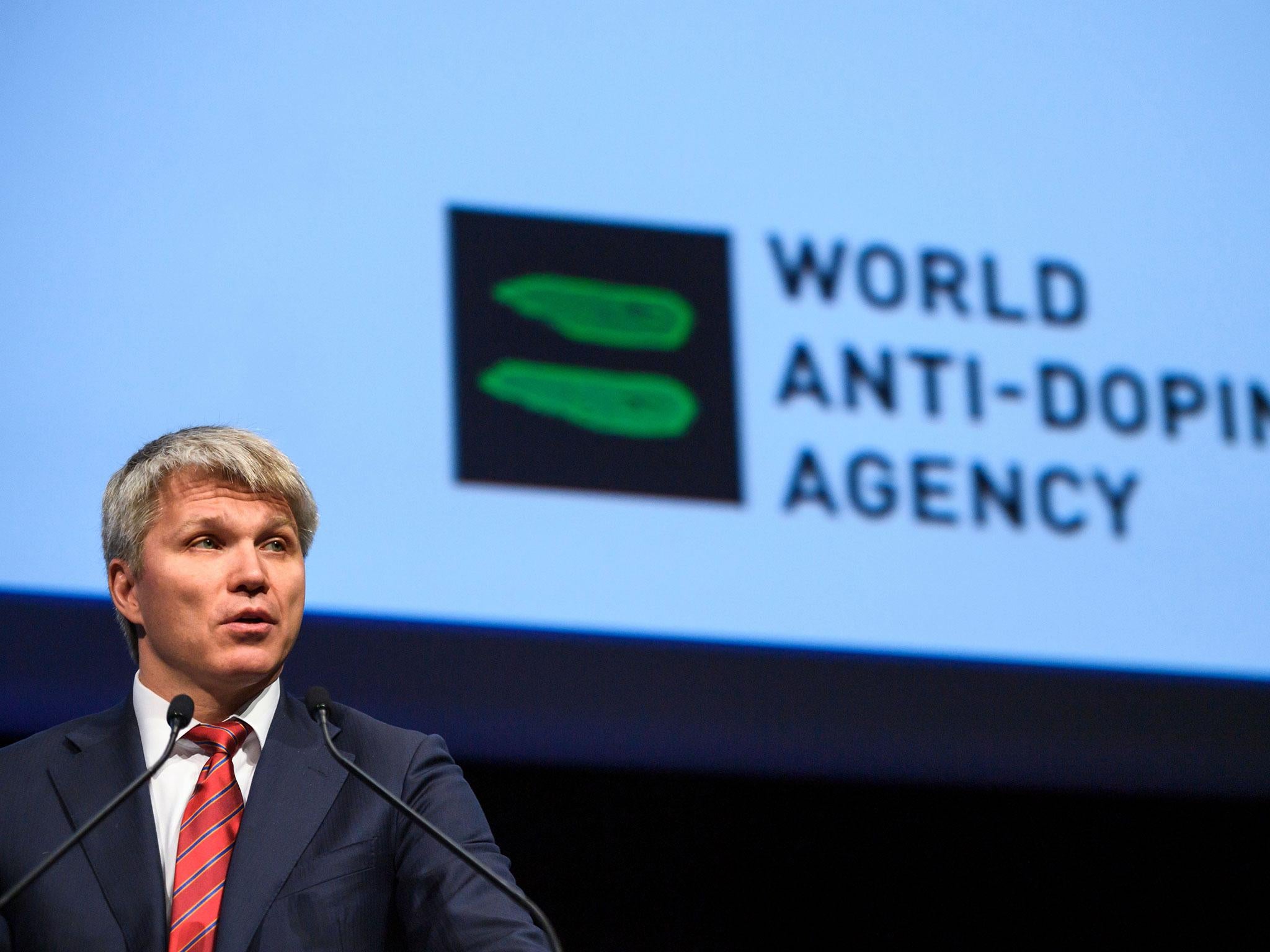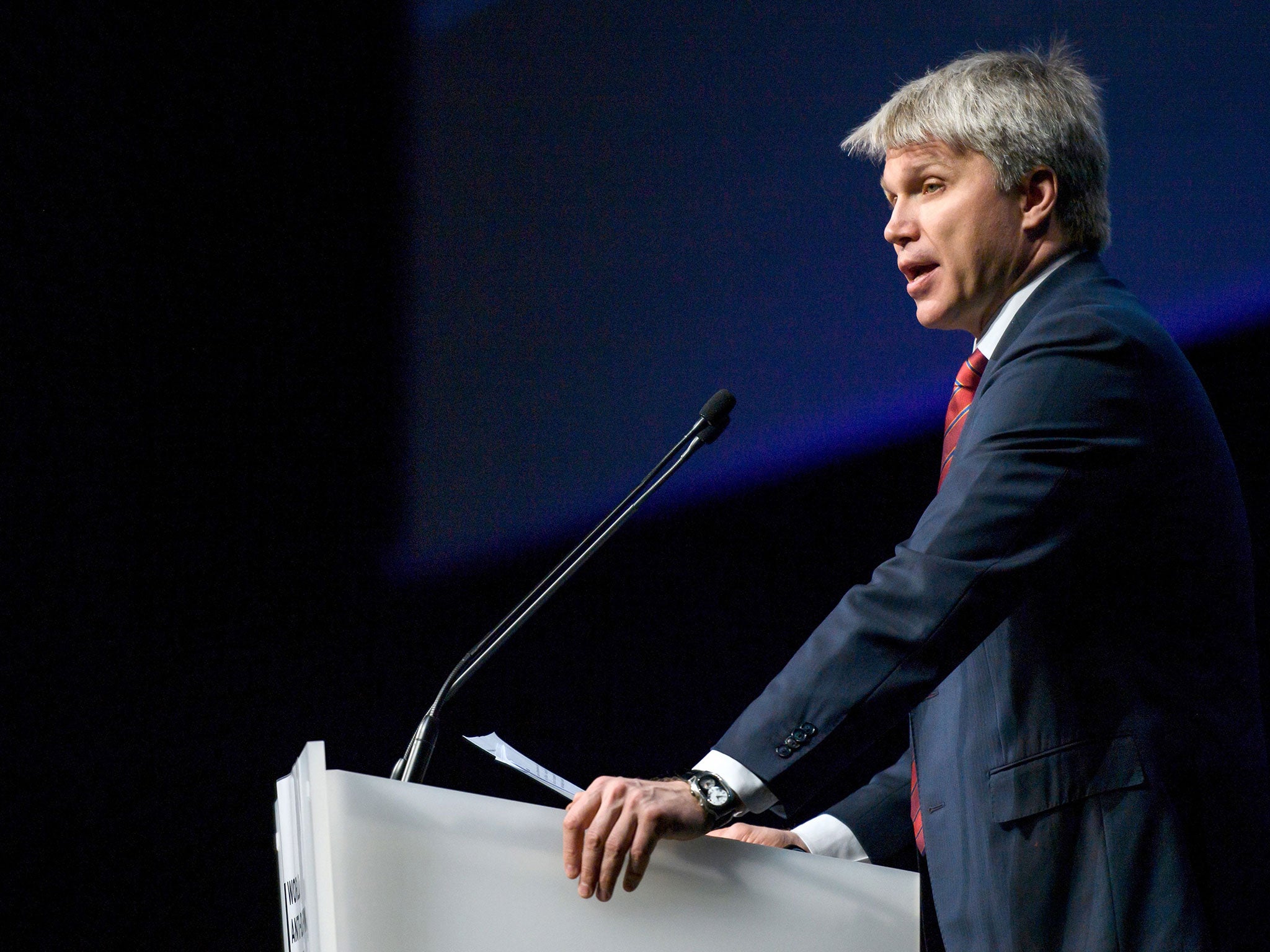Russia never state sponsored doping and are 'ready to pass any test' claims sports minister
Kolobkov was speaking to more than 700 delegates at the World Anti-Doping Agency's (WADA) annual symposium in Lausanne

Your support helps us to tell the story
From reproductive rights to climate change to Big Tech, The Independent is on the ground when the story is developing. Whether it's investigating the financials of Elon Musk's pro-Trump PAC or producing our latest documentary, 'The A Word', which shines a light on the American women fighting for reproductive rights, we know how important it is to parse out the facts from the messaging.
At such a critical moment in US history, we need reporters on the ground. Your donation allows us to keep sending journalists to speak to both sides of the story.
The Independent is trusted by Americans across the entire political spectrum. And unlike many other quality news outlets, we choose not to lock Americans out of our reporting and analysis with paywalls. We believe quality journalism should be available to everyone, paid for by those who can afford it.
Your support makes all the difference.Russian sports minister Pavel Kolobkov has told the global anti-doping community his country is "ready to pass any test" but once again denied there has ever been a "state-sponsored" programme in Russia.
The former Olympic fencing champion, who replaced Vitaly Mutko as sports minister in October, was speaking to more than 700 delegates at the World Anti-Doping Agency's (WADA) annual symposium in Lausanne.
He started his speech by saying the "greatest tragedy" in Russian sport is that clean athletes have been banned from competing by the International Association of Athletics Federations (IAAF) and International Paralympic Committee (IPC), describing this as "simply inhuman".
The 47-year-old then listed the progress Russia has made in overhauling its anti-doping system since a WADA-funded investigation confirmed media reports of endemic cheating in Russian athletics.
That investigation, led by former WADA president Dick Pound, resulted in the Russian athletics federation and anti-doping agency RUSADA being suspended and the Moscow anti-doping laboratory shut down in November 2015.
Kolobkov said: "We are ready for inspections and ready to pass all external tests - we don't object to this.
"We are working on WADA's criteria and hope to have them accepted in May, and then be fully reinstated in November."
He explained that doping has been criminalised in Russia, RUSADA has been made independent of government and its budget tripled.
Kolobkov, a member of WADA's foundation board until RUSADA's suspension, also noted the recent comments from Russian President Vladimir Putin that the country did have an anti-doping problem and "we should spell it out and admit it".
Russia's acceptance of its problems, however, only goes so far, and just as Putin denied there was any state involvement in the cheating, Kolobkov restated the party line that RUSADA was hijacked by corrupt individuals, in particular the head of the Moscow laboratory Grigory Rodchenkov.
Now in hiding in the United States, Rodchenkov is the main whistleblower for a second WADA-sponsored investigation in 2016, this time conducted by Canadian law professor Richard McLaren.
His explosive report revealed an "institutionalised" Russian doping programme that "sabotaged" the London 2012 and Sochi 2014 Olympics, and helped more than 1,000 Russian athletes from almost all sports evade tests.
Kolobkov, however, claimed an ongoing Russian criminal investigation has revealed Rodchenkov "abused his office" and doped athletes by giving them substances without explaining what they were.
Noting Rodchenkov's 2011 arrest on drug-trafficking charges, Kolobkov said "We don't understand how you can believe the testimony of somebody who has been involved in crimes."
He also claimed that Russia's investigation into the scandal has been impeded by a lack of cooperation from the authorities in Canada, Switzerland and US.
The Canadians, Kolobkov said, have been asked for help in getting more information from the Montreal-based WADA, while requests to the US for permission to interview Rodchenkov have not been answered. Requests to speak to the Swiss manufacturer of the anti-doping sample bottles which McLaren's report revealed had been tampered with in Russia, have also gone unheeded.

Kolobkov concluded by saying he was unaware of any evidence in McLaren's report that would result in anti-doping cases being brought against individual athletes.
Reaction to his speech was mixed in the SwissTech Convention Center auditorium, with one senior WADA representative telling Press Association Sport it was "brave but a bit of a curate's egg". Another delegate said "there were some good parts" but the attempt to blame Rodchenkov for everything would "not play well".
Earlier on, WADA president Sir Craig Reedie said "the ball is firmly in Russia's court" in terms of its return to compliance with anti-doping rules, while the agency's director general Olivier Niggli gave a thorough update on the current situation.
Listing the steps already taken in Russia, including handing over the testing programme to UK Anti-Doping, Niggli said there were 2,300 "good tests" done in the country last year but 2,344 planned tests were cancelled due to a shortage of doping control officers and other problems.
He said Russia was "well aware time is of the essence" if is to be reinstated this year but welcomed Putin's intervention as "going in the right direction".
"They know what they have to do, we'll see when they are able to deliver," said Niggli.
An indication of how deep Russia's problems go, however, arrived shortly after Kolobkov's speech when the Court of Arbitration for Sport announced a lifetime ban for Dr Sergei Portugalov, a senior Russian sports doctor who is known to have worked across several sports, including athletics and swimming.
PA
Join our commenting forum
Join thought-provoking conversations, follow other Independent readers and see their replies
Comments